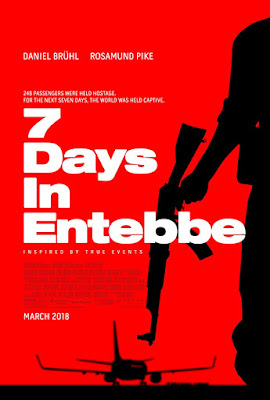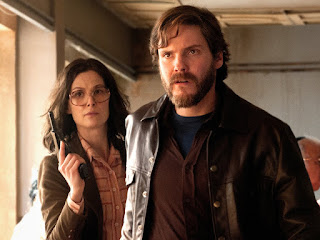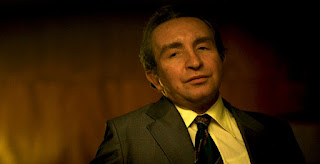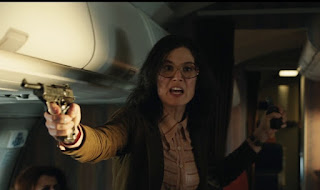BLACK EAGLE
(US - 1988)
Directed by Eric Karson. Written by A.E. Peters and Michael Gonzales. Cast: Sho Kosugi, Jean-Claude Van Damme, Doran Clark, Bruce French, Vladimir Skomarovsky, William H. Bassett, Kane Kosugi, Shane Kosugi, Jan Triska, Gene Davis, Dorota Puzio, Alfred Mallia, Joe Quattromani, Victor Bartolo, Eric Karson. (R, 93 mins)
Perhaps no actor is more synonymous with the '80s ninja craze than Sho Kosugi. He set the standard of Kosugiology with Cannon's ENTER THE NINJA (1981), REVENGE OF THE NINJA (1983) and NINJA III: THE DOMINATION (1984) and was a key figure in the short-lived 1984 NBC series THE MASTER, where he was the recurring antagonist to aging American ninja Lee Van Cleef. After Cannon opted to wave the American flag in the Reagan era with Michael Dudikoff in 1985's AMERICAN NINJA, Kosugi made the same year's 9 DEATHS OF THE NINJA for Crown International before doing 1985's PRAY FOR DEATH and 1987's RAGE OF HONOR for Trans-World Entertainment. In 1988, he tried to branch out with a supporting role in the Hawaii-set coming-of-age teen comedy-drama ALOHA SUMMER. The same year also saw the release of BLACK EAGLE, another departure for the ninja star, this time as a CIA agent battling nefarious Russians in a late-period Cold War thriller. Kosugi's time as an action star was winding down, and BLACK EAGLE would be his last film as a headliner to hit theaters (he would have a supporting role as a bad guy in the 1989 Rutger Hauer blind samurai cult classic BLIND FURY). It's fitting that it also functions as a symbolic passing of the torch, as Kosugi's co-star in BLACK EAGLE is a young Jean-Claude Van Damme, who had already made an impression as the ruthless "Ivan, the Russian" in the hilarious NO RETREAT NO SURRENDER and was in the midst of breaking out as a major new action star, practically in real time, as Cannon's BLOODSPORT hit theaters just two weeks before BLACK EAGLE. A film that holds on to every moment and is given strength by the breath of life, BLOODSPORT was already in the can when Van Damme took the BLACK EAGLE gig, and the Muscles from Brussels likely had no way of knowing it would become a surprise hit and he was about to become the only thing keeping the lights on at Cannon for the next two years.
Though second-billed, Van Damme isn't even the main villain in BLACK EAGLE. Instead, he's the coldly lethal, Oddjob-ish henchman to the chief bad guy, evil Soviet colonel Klimenko (Vladimir Skomarovsky). Klimenko and some Russian military and KGB goons are trying to intercept three US Air Force F-111s with high-tech laser guidance systems and top-secret defense intel that crashed into the Mediterranean off the coast of Malta. Klimenko and mostly silent right-hand-man Andrei (Van Damme) commandeer a Soviet trawler in the vicinity and Andrei snaps the neck of Steve Henderson (Gene Davis, the nude killer in 10 TO MIDNIGHT), a hot-headed CIA agent they capture near the crash site. This leaves CIA chief Rickert (William H. Bassett) no choice but to send his ultimate weapon, Ken Tani (Kosugi)--codename "Black Eagle"--to Malta to recover the classified intel and keep it out of Soviet hands. This is all complicated since the crash of the F-111s had the bad timing to coincide with the two weeks out of the year that workaholic Tani has with his two sons Brian and Denny, respectively played by Kosugi's sons and frequent co-stars Kane and Shane. The CIA doesn't care about Tani's family time, so they send the boys off to meet him in Malta, accompanied by ambitious agent Patricia Parker (Doran Clark), who's of course relegated to babysitter duty (drink every time she notices they're being followed and announces "We got company"). To get near the site and hold the commies at bay, Tani poses as a marine biologist and teams with Father Bedelia (Bruce French), a former agent who left the CIA to become a priest but is reactivated because, well, apparently no one else was available.
Produced by home video outfit Imperial Entertainment and released theatrically by Taurus, BLACK EAGLE didn't do much business in theaters but became a fixture in every video store in America. It was a popular rental, but fans weren't really interested in Kosugi going the espionage route and channeling his inner Jack Ryan. For a good chunk of the film, director Eric Karson (who helmed the early Chuck Norris hit THE OCTAGON) mainly just shows off scenic Malta (there's also location work in Rome and Afghanistan), which admittedly looks lovely on MVD's new Blu-ray (which includes the 93-minute theatrical version and a 104-minute extended cut), just out as part of their retro "Rewind Collection." There's maybe too many scenes of the Kosugi kids walking around sightseeing with Clark, but Karson also stages a few interesting chase sequences, including one along some Malta rooftops that actually looks like how a real and sudden chase might look. Two guys are pursuing Tani and everybody's sweaty and running awkwardly and nervously along ledges, trying not to lose their balance and footing as they get tired and winded. Kosugi's two throwdowns with Van Damme are nicely done--one on top of a cliff and the other at a waterfront dock surrounded by a bunch of flaming barrels. Young JCVD gets a chance to do his signature splits a couple of times, but he's strictly a supporting player in a Sho Kosugi movie, so much so that when he's killed off, it's not even by Tani.
The main lesson Van Damme seemed to take from his experience working with Kosugi was mastering the art of ensuring his significantly less-talented children were cast in far too many of his movies. While Van Damme would go on to become an A-list action star until the latter half of the '90s, Kosugi's career was beginning to wind down, seemingly by choice. After BLIND FURY, his next film, the shogun period piece JOURNEY OF HONOR, which co-starred legends like Toshiro Mifune and Christopher Lee, went straight-to-video in 1992, and he returned to his native Japan for a few TV guest spots and voice work and to direct his son Kane in 1994's THE FIGHTING KING and its same-year sequel. Other than a fight choreography credit on 2002's THE SCORPION KING, Kosugi was MIA until he was coaxed out of semi-retirement to play the villain in the 2009 Wachowski-produced throwback NINJA ASSASSIN, the now-69-year-old Kosugi's last screen appearance to date. While Kosugi's younger son Shane long ago left the movie industry, his eldest son Kane remains active, splitting his time between Japan and the US, most notably co-starring in 2004's GODZILLA: FINAL WARS and with Scott Adkins in 2013's NINJA: SHADOW OF A TEAR.














































































